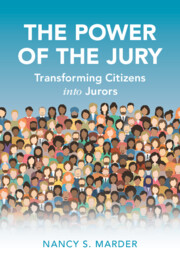Book contents
- The Power of the Jury
- Cambridge Studies in Law and Society
- The Power of the Jury
- Copyright page
- Contents
- Acknowledgments
- Introduction
- 1 The Summons and the Setting: Beginning the Transformation of Citizens into Jurors
- 2 Voir Dire: Introducing Jurors to the Judge, Their Fellow Jurors, and Their Role
- 3 Peremptory Challenges: A Barrier That Unnecessarily Limits Who Can Serve as Jurors
- 4 Jury Instructions: Reinforcing Group Identity and Making Instructions Accessible to Jurors
- 5 Jury Deliberations: Performing the Jury’s Main Task with Some Assistance from the Judge
- 6 The Post-Verdict Interview: How Judges Can Help Jurors in Their Transformation from Jurors into Engaged Citizens
- Conclusion
- Index
- Cambridge Studies in Law and Society
Conclusion
Published online by Cambridge University Press: 25 August 2022
- The Power of the Jury
- Cambridge Studies in Law and Society
- The Power of the Jury
- Copyright page
- Contents
- Acknowledgments
- Introduction
- 1 The Summons and the Setting: Beginning the Transformation of Citizens into Jurors
- 2 Voir Dire: Introducing Jurors to the Judge, Their Fellow Jurors, and Their Role
- 3 Peremptory Challenges: A Barrier That Unnecessarily Limits Who Can Serve as Jurors
- 4 Jury Instructions: Reinforcing Group Identity and Making Instructions Accessible to Jurors
- 5 Jury Deliberations: Performing the Jury’s Main Task with Some Assistance from the Judge
- 6 The Post-Verdict Interview: How Judges Can Help Jurors in Their Transformation from Jurors into Engaged Citizens
- Conclusion
- Index
- Cambridge Studies in Law and Society
Summary
If, as this book argues, jurors are made, not found, and it is the stages of the jury process that transform jurors into responsible jurors, what are the implications of this new understanding of the American jury system? One implication is that more citizens can serve as jurors. The traditional view is that only those who enter the courtroom as ready-to-serve jurors can be jurors, but this is a limited view of who can serve. If, instead, the jury process is what brings about the transformation of citizens into jurors, then most citizens can serve. In the United States, citizens who might have doubts about their ability to be a juror should be reassured that they can serve, and serve well. Citizens in other countries who might have doubts about their ability to be jurors, particularly in countries that do not have a tradition of juries, should also be reassured. If the stages of their jury process track those in the United States, and their judges play a similar role as judges in the United States, then their jury process will transform citizens into jurors too.
- Type
- Chapter
- Information
- The Power of the JuryTransforming Citizens into Jurors, pp. 244 - 257Publisher: Cambridge University PressPrint publication year: 2022



